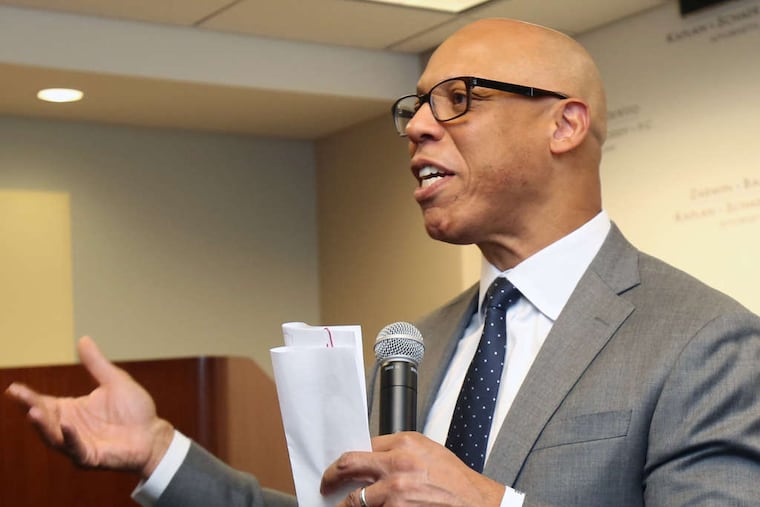School board gets details on Philly reopening, earful from public
With a stock of old buildings and a shaky history of building maintenance, the school system has a daunting job getting buildings ready, officials said.

With the Philadelphia School District gearing up for a late November return to in-person learning for some students, the school board heard details Thursday about building readiness — and got an earful about the proposed reopening plan.
Superintendent William R. Hite Jr. said that school buildings were on track to be able to accommodate up to 32,000 prekindergarten through second-grade students two days a week beginning Nov. 30. But less than half of district schools have had ventilation capacity checked to date, and of those, 25 buildings currently have ventilation systems that would render them nonoperational.
In some cases, the district will bring in fans to circulate air to bolster ventilation systems. School staff may need to unplug refrigerators and coffee pots, officials said, to accommodate the equipment that could be needed to keep adequate airflow in buildings where electrical power is an issue.
With a stock of old buildings and a shaky history of building maintenance, the school system has a daunting job getting buildings ready, officials said.
But the district “will not be opening any schools for in-person learning unless we’re confident that every health and safety condition has been met," school board president Joyce Wilkerson said.
Some parents, teachers, and members of the public were skeptical.
Emily Seiter, the school nurse at McClure Elementary in North Philadelphia, is alarmed by the notion that the district is banking on opening windows and using window fans as forms of ventilation.
“This plan will cause COVID to spread in our schools,” Seiter told the board. “Dismissing this reality, by saying ‘naturally there will be cases’ is unacceptable, because when we’re talking about COVID, cases equal deaths. Maybe not as many students, but certainly parents, and grandparents, and staff. Their lives matter, too.”
A group of Elkin Elementary staff told the board they were told last school year that a new, much-needed HVAC system would be installed in their school over the summer. It never materialized. Their building is old, and nine classrooms have no windows.
“None of these issues can be remedied overnight to provide any sort of outdoor airflow to the extent necessary,” the teachers said in written testimony to the board. “Why should we trust the district to remedy these issues moving forward?”
Jackson Elementary parent Sarah Kloss said she didn’t have enough information on whether buildings would be ready, just “a vague PowerPoint that basically promises everyone will try their best. History has told us that the School District of Philadelphia does not always follow through on promises to keep students and staff safe.”
The board does not need to vote on the reopening plan, which aims to bring back students with complex needs in January and ninth graders and career and technical education students by February; this summer it approved the broad outlines of health and safety requirements.
Still, Daniel Symonds, a district teacher, reminded the board it had the power to direct Hite to rethink things.
“There is still time to turn this foolhardy plan around and keep students, families, and educators safe,” Symonds said. “Common sense is knowing that we would all like to be back to in-person schooling, but we don’t have that choice.”
Meanwhile, the Philadelphia Federation of Teachers, which on Wednesday agreed to a tentative labor contract with the district, has separately signed a memorandum of understanding with the district what allows it to review air quality and building conditions.
PFT received the schools' ventilation reports Thursday; union president Jerry Jordan, in a statement, said that teachers won’t go back unless conditions are right.
“Given the district’s years of deferred maintenance, and massive district-wide ventilation issues, reopening in any capacity will be enormously challenging, and our analysis of the ventilation reports and other standards will determine the feasibility of these efforts,” Jordan said.
Nevertheless, decisions on reopening classrooms are not easily reached.
Amina Malik, a district parent and member of the board’s parent advisory council, said that while some families don’t want their kids back until they feel it’s safer, others are in a different place.
“Many parents said, ‘Children aren’t learning. School buildings need to be open,’ ” said Malik.
Jennifer Kolker, parent of a Central High senior and an associate dean at Drexel University’s Dornsife School of Public Health, told the board in written comments that while she applauded the efforts to return the youngest learners to the classroom in November, she’s concerned that there’s no timetable to get seniors back in school. Twelfth graders need in-person experiences to ready themselves for the next steps of their lives, she said.
“Philadelphia’s Health Commissioner said as recently as yesterday that he believes children can return to school safely and that the mental health and long-term health of Philadelphia’s children is at stake — COVID-19 risk should not be our only consideration,” Kolker wrote to the board.